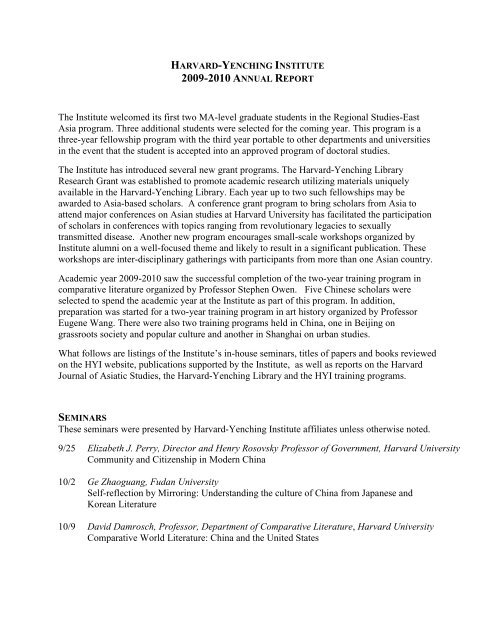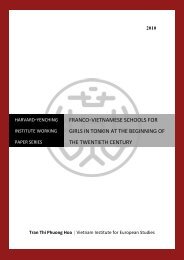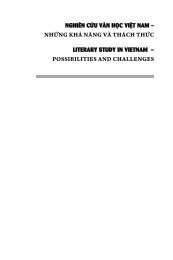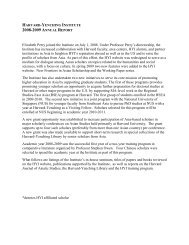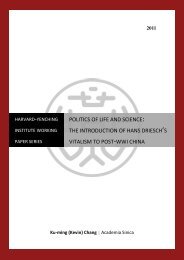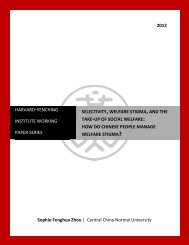FYI10 Annual Report - Harvard-Yenching Institute
FYI10 Annual Report - Harvard-Yenching Institute
FYI10 Annual Report - Harvard-Yenching Institute
You also want an ePaper? Increase the reach of your titles
YUMPU automatically turns print PDFs into web optimized ePapers that Google loves.
HARVARD-YENCHING INSTITUTE<br />
2009-2010 ANNUAL REPORT<br />
The <strong>Institute</strong> welcomed its first two MA-level graduate students in the Regional Studies-East<br />
Asia program. Three additional students were selected for the coming year. This program is a<br />
three-year fellowship program with the third year portable to other departments and universities<br />
in the event that the student is accepted into an approved program of doctoral studies.<br />
The <strong>Institute</strong> has introduced several new grant programs. The <strong>Harvard</strong>-<strong>Yenching</strong> Library<br />
Research Grant was established to promote academic research utilizing materials uniquely<br />
available in the <strong>Harvard</strong>-<strong>Yenching</strong> Library. Each year up to two such fellowships may be<br />
awarded to Asia-based scholars. A conference grant program to bring scholars from Asia to<br />
attend major conferences on Asian studies at <strong>Harvard</strong> University has facilitated the participation<br />
of scholars in conferences with topics ranging from revolutionary legacies to sexually<br />
transmitted disease. Another new program encourages small-scale workshops organized by<br />
<strong>Institute</strong> alumni on a well-focused theme and likely to result in a significant publication. These<br />
workshops are inter-disciplinary gatherings with participants from more than one Asian country.<br />
Academic year 2009-2010 saw the successful completion of the two-year training program in<br />
comparative literature organized by Professor Stephen Owen. Five Chinese scholars were<br />
selected to spend the academic year at the <strong>Institute</strong> as part of this program. In addition,<br />
preparation was started for a two-year training program in art history organized by Professor<br />
Eugene Wang. There were also two training programs held in China, one in Beijing on<br />
grassroots society and popular culture and another in Shanghai on urban studies.<br />
What follows are listings of the <strong>Institute</strong>’s in-house seminars, titles of papers and books reviewed<br />
on the HYI website, publications supported by the <strong>Institute</strong>, as well as reports on the <strong>Harvard</strong><br />
Journal of Asiatic Studies, the <strong>Harvard</strong>-<strong>Yenching</strong> Library and the HYI training programs.<br />
SEMINARS<br />
These seminars were presented by <strong>Harvard</strong>-<strong>Yenching</strong> <strong>Institute</strong> affiliates unless otherwise noted.<br />
9/25 Elizabeth J. Perry, Director and Henry Rosovsky Professor of Government, <strong>Harvard</strong> University<br />
Community and Citizenship in Modern China<br />
10/2 Ge Zhaoguang, Fudan University<br />
Self-reflection by Mirroring: Understanding the culture of China from Japanese and<br />
Korean Literature<br />
10/9 David Damrosch, Professor, Department of Comparative Literature, <strong>Harvard</strong> University<br />
Comparative World Literature: China and the United States
10/23 Robert Weller, Professor and Chair of Anthropology and Research Associate, <strong>Institute</strong> of<br />
Culture, Rleigion and World Affairs, Boston University<br />
Religion and the Public Good in Modern Chinese Societies<br />
10/30 Melissa McCormick, Professor of Japanese Art and Culture, Department of East Asian<br />
Languages and Civilizations, <strong>Harvard</strong> University<br />
(Co-sponsored by the Reischauer <strong>Institute</strong> of Japanese Studies)<br />
“The Spirit of the Chrysanthemum” (Kiku no sei monogatari) and Flower<br />
Personaification in Medieval Japanese Art<br />
11/6 Han Joon, Associate Professor of Sociology, Yonsei University; Discussant: Frank<br />
Dobbin, Professor of Sociology, <strong>Harvard</strong> University<br />
(Co-sponsored by the Korea <strong>Institute</strong>)<br />
Social Consequences of Rapid Expansion of Higher Education in South Korea<br />
11/13 Eugene Wang, Abby Aldrich Rockefeller Professor of Asian Art, <strong>Harvard</strong> University<br />
The Alchemy and Jouissance of Death: Sichuan Sarcophagi in New Perspective<br />
11/ 16 Gao Fengfeng, Professor of Literature, Peking University; Discussant: Richard Thomas,<br />
Professor of Greek and Latin, Classics Department, <strong>Harvard</strong> University<br />
Proba’s Virgilian Cento<br />
11/20 Liu Heng, Discussant: Michael Herzfeld, Professor of Anthropology, <strong>Harvard</strong> University<br />
Ethnographic Biography: How the Personal Connects with the Professional Zhou Enlai<br />
12/11 Itagaki Ryuta, Professor of Anthopology, Doshisha University; Discussant: Andrew<br />
Gordon, Lee and Juliet Folger Fund Professor of History, <strong>Harvard</strong> University<br />
(Co-sponsored by the Korea <strong>Institute</strong>)<br />
The Politics of “Illicitly Brewed Liquor” in Colonial Korea<br />
1/28 Wang Wei, Professor of Linguistics, Chinese Academy of Social Sciences; Discussants:<br />
Gennaro Chierchia, Haas Foundations Professor of Linguistics and James Huang,<br />
Department of Linguistics, <strong>Harvard</strong> University<br />
Is the Past Always Behind Us? A Past-Oriented Model for the Chinese Perfective Aspect<br />
Marker “Le”<br />
2/10 Kuah-Pearce Khun Eng, Chinese University of Hong Kong; Discussant: Arthur<br />
Kleinman, Esther and Sidney Rabb Professor, Department of Anthropology, <strong>Harvard</strong><br />
Univeristy and Professor of Medical Anthropology in Social Medicine and Professor of<br />
Psychiatry, <strong>Harvard</strong> Medical School; Director, <strong>Harvard</strong> University Asia Center<br />
Humanistic Buddhism and Its Global Philanthropic Reach<br />
2/18 C.T.James Huang, Professor of Linguistics, <strong>Harvard</strong> University<br />
Variation and change in language: an East Asian perspective<br />
3/2 Joseph Fewsmith, Professor, Department of International Relations, Boston University<br />
Institutions, Institutionalization, and Governance in China
3/11 Martin Whyte, Professor of Sociology, <strong>Harvard</strong> University<br />
The Impact of Market Reforms on the Health of Chinese Citizens: Examining Two<br />
Puzzles<br />
3/19 What is Chinese Philosophy? Four Expositions on its Characteristics by Scholars from<br />
National Taiwan University; Discussants Michael Puett and Sato Masayuki<br />
Chair: Masayuki Sato, Associate Professor, National Taiwan University<br />
Bau-ruei Duh, Associate Professor, National Taiwan University<br />
Chinese Philosophy on Self-cultivation: With Cosmological and Ontological Approach<br />
Yao-ming Tsai, Associate Professor, National Taiwan University<br />
Chinese Philosophy on Meaning of Life and Death from a Buddhist Viewpoint<br />
Chair: Michael Puett, Professor, EALC, <strong>Harvard</strong> University<br />
Wim De Reu, Assistant Professor, National Taiwan University<br />
Chinese Philosophy on Language and Knowledge: With a Close Focus on the Zhuangzi<br />
Masayuki Sato, Associate Professor, National Taiwan University<br />
Chinese Philosophy on State and Society: The Concept of Li in the Xunzi<br />
3/31 Lee Sung Yup, Professor of History, Kyoto University; Discussant: Andrew Gordon, Lee<br />
and Juliet Folger Fund Professor of History<br />
(Co-sponsored with the Korea <strong>Institute</strong> and the Reischauer <strong>Institute</strong> of Japanese Studies)<br />
Re-examining the Relations between the Imperial Diet of Japan and Colonial Korea<br />
4/7 Kim Sung-ho, Professor of Political Science, Yonsei University; Discussants: Professors<br />
Carter Eckert and Andrew Gordon<br />
(Co-Sponsored with the Korea <strong>Institute</strong> and the Reischauer <strong>Institute</strong> of Japanese Studies)<br />
How the East Was Won: “Imposed Constitutionalism” in Postwar Japan and Postcolonial<br />
Korea, 1945-1948<br />
4/8 Wu Xiaohong, Professor of Archaeology, Peking University; Discussant: Rowan Flad,<br />
Department of Anthropology<br />
(Co-sponsored by the Fairbank Center for Chinese Studies)<br />
Precision of Radiocarbon Dating for the Key Project of Origins and Development of<br />
Chinese Civilization in China<br />
4/13 Cao Jin, Professor, School of Journalism, Fudan University; Discussants: Joan Kaufman,<br />
Lecturer in Social Medicine at <strong>Harvard</strong> Medical School and founding Director of the AIDS<br />
Public Policy Training Project, <strong>Harvard</strong> Kennedy School and Bradley S. Epps, Professor of<br />
Romance Languages and Literature and of Studies of Women, Gender, and Sexuality,<br />
<strong>Harvard</strong> University<br />
Case Study of a Lesbian Health Hotline in a Peripheral Chinese City<br />
4/21 Lu Hongliang, Professor of Archaeology, Sichuan University; Discussant: Rowan Flad,<br />
Atnrhopology Department, <strong>Harvard</strong> University<br />
Trans-Himalayas Interaction during the First Millenium BC<br />
4/22 Hu Suhua, Professor, <strong>Institute</strong> for Chinese Minority Languages, Minzu University of<br />
China; Discussants: Professor James Huang, Linguistics Department and Professor Feng<br />
Shengli, EALC Department, <strong>Harvard</strong> University<br />
The Morpheme SU—Determiner and Complementizer in Nuosu Yi Language
4/23 Jenny So, Professor of Fine Arts, Director, <strong>Institute</strong> of Chinese Studies, Chinese<br />
University of Hong Kong<br />
Co-sponsored by the <strong>Harvard</strong> East Asian Archaeology Seminar<br />
Antique Jades in Antiquity: Heritage? Collectible? Or Material Resource?<br />
4/28 Feng Xiaocai, Professor of History, Fudan University; Discussant: Elizabeth Perry,<br />
Director, <strong>Harvard</strong>-<strong>Yenching</strong> <strong>Institute</strong>; Henry Rosovsky Professor of Government,<br />
<strong>Harvard</strong> University<br />
Co-sponsored by the Fairbank Center for Chinese Studies<br />
Politicization of Association in Modern China<br />
4/29 Kuong Teilee, Professor of Lawn, Nagoya University; Discussant: Duncan Kennedy<br />
Development of the legal and institutional concept of property in Cambodia, China and<br />
Vietnam<br />
5/12 SATO Masayuki, Professor of Philosophy, National Taiwan University<br />
The Issue and Role of Xunzi Studies for the Articulation of the Confucian Values for the<br />
21st Century; Discussant: Professor Michael Puett, EALC<br />
NEW FRONTIERS IN ASIAN SCHOLARSHIP<br />
The following books were reviewed for the series which was established in 2009.<br />
1968: Youths’ Revolts and Their Background / The End of the Revolts and Their Legacy by<br />
Oguma Eiji. Reviewed by Hideaki Fujiki<br />
ASEAN Economic Community: Content and Roadmap edited by Nguyen Hong Son. Reviewed<br />
by Nguyen Manh Hung.<br />
The Banhar Epic Cycle in Kontum, By Phan Thi Hong. Reviewed by Tran Thi Phuong Phuong<br />
A Biography of Dudgeon: A British Medical Missionary and the Medical Modernization of the<br />
Late Qing Dynasty by Gao Xi. Reviewed by Liu Ping<br />
A Cliometric Review of Late Chosŏn History, Edited by Rhee Young Hoon. Reviewed by Ilsoo<br />
David Cho<br />
Collectivism, Individualism and “the self” of the Vietnamese Today Edited by DO Long and<br />
PHAN Thi Mai Huong. Reviewed by Hoang M. To Nga<br />
Disrespect/Respect: A theoretical viewpoint in philosophical and sociological studies, Vol. 1 by<br />
Tô Duy Hợp. Reveiwed by Le Ngoc Hung<br />
Earthbreaking Studies on Illustrations in Shanhaijing: Ma Changyi and Her Recent Two Books<br />
on Shanhaijing Reviewed by Lihui Yang
Flying Dragon in Luoyang, Record of Three Generations of Literary Talent, and Records<br />
Showing the Distinction between Right and Wrong Reviewed by Yoong-hee Jo<br />
From People to Citizens by Choi Jang-jip (Seoul: Dolbegae, 2009), reviewed by Professor Park<br />
Tae Gyun<br />
Heritage and Betrayal: A Treatise on the Emergence of Modern Science in Western Civilization<br />
By Chen Fong-ching. Reviewed by Wu Fengshi<br />
A Historical Outline of Daoist Rituals before the Tang Dynasty by Lü Pengzhi. Reviewed by<br />
Professor Guo Wu (Sichuan University)<br />
Incarceration and the Incarcerated: Power and Resistance by Saipin Suputtamongkol, reviewed<br />
by Non Arkaraprasertkul.<br />
Japanese Culture in East Asia By Murai Shosuke (Tokyo: Hoso Daigaku Kyoiku Shinkokai,<br />
2005). Reviewed by Mitani Hiroshi (University of Tokyo)<br />
Mental Disorders of the Tao Aboriginal Minority in Taiwan: Modernity, Social Change, and the<br />
Origin of Social Suffering By Yu-yueh Tsai. Reviewed by Shang-Jen Li<br />
The Military Establishment and the Integration of the People: From the Sino-Japanese War to<br />
the period of the Manchurian Incident by YUI Masaomi. Reviewed by Okamoto Koichi<br />
Modernity, Asia, and the Yangming Schoolby Ogyû Shigehiro. Reviewed by Makabe Jin.<br />
Phoenix, Oh Phoenix: Collected Essays on Madness in Chinese Literature Edited by Tamotsu<br />
Sato, Reviewed by Akiyoshi Yagi<br />
Mural Painting in Buddhist Monasteries By San Phalla. Reveiwed by Heng Piphal<br />
The Nomad’s Choice :The First Encounter Between Northern Nomads and Imperial China by<br />
Wang Mingke. Reviewed by Liang Zhao<br />
The Plight of China’s Working Class: Annals of Anyuan by Yu Jianrong, in Chinese, Mirror<br />
Books 2006. Reviewed by Yan Xiaojun<br />
Reading Against the Grain: Collected Essays on Literary Studies, and Criticism on Thai and<br />
World Literature By Chusak Pattarakulvanit. Reviewed by Janit Feangfu.<br />
Studies on the Beliefs of Local Shrines in Song China by Pi Qingsheng. Reviewed by Dr. Lei<br />
Wen<br />
Taste of Luxury: Consumer society and the scholar-literati circle in the late Ming dynasty by<br />
WU Jen-shu. Reviewed by Sylvia Wun-sze Lee
The Tragic History of the KMT Troops in the Golden Triangle, 1950-1981 By Qin Yihui.<br />
Reviewed by Chang Wen-Chin<br />
Tran Dinh Huou’s Selected Works (Trần Đình Hượu Tuyen Tap), 2 vols. Hanoi: Publishing<br />
House of Education, 2008, reprinted in 2009. Reviewed by Trần Hải-Yến<br />
The Transformation of Religions and Religious Beliefs in Vietnam Today, Reviewed by Pham<br />
Quynh Phuong<br />
Transforming Knowledge into Wisdom: a review of The Collected Works of Feng Qi Reviewed<br />
by YU Zhenhua<br />
When Law Meets Economy: Commercial Law in Ming-Qing China by CHIU Peng-sheng.<br />
Reviewed by LI Cho-ying<br />
WORKING PAPER SERIES<br />
The following as yet published papers were posted on the HYI Website during 2009-2010.<br />
Development of Property Law in Cambodia, Vietnam and China: What is behind the legal<br />
reforms in transition to a market economy? (KUONG Teilee, Nagoya University; HYI Visiting<br />
Scholar 2009-2010)<br />
Recent Quest for Religious Roots: The Cult of Guangze Zunwang, Temple Networks, and Inter-<br />
Temple Rivalries in Southeast China, 1978-2009 (Jack Meng-Tat CHIA, <strong>Harvard</strong> University;<br />
HYI-RSEA Scholar, 2009-2013)<br />
Cambodian Constitutional Provisions on Treaties: A Story of Constitutional Evolution Beyond<br />
Rhetoric (KUONG Teilee, Nagoya University; HYI Visiting Scholar 2009-2010)<br />
Displaying Chinese Folklore to the World: the 2008 Olympic Games and International Folkloric<br />
Tourism in Gaobeidian Village, Beijing (YANG Lihui, Professor, <strong>Institute</strong> of Folklore and<br />
Cultural Anthropology, Beijing Normal University; HYI Associate, 2006-07)<br />
Assessment of the Social Functions and Vitality of the Yi Language from the Perspective of its<br />
Domains of Use (HU Suhua, Minzu University of China; HYI Visiting Scholar 2009-2010)<br />
OVERSEAS PUBLICATIONS<br />
In addition to the ongoing publications supported by the <strong>Institute</strong>, China Scholarship, <strong>Yenching</strong><br />
Journal and History of Chinese Philosophy, the <strong>Institute</strong> supported the second volume, Literary<br />
Study in Vietnam: Possibilities and Challenges,of the Vietnamese language series HYI<br />
Publication Series in Social Sciences and Humanities Vietnamese, which is the first peerreviewed,<br />
academically independent publication in Vietnam.
WORKSHOPS AND CONFERENCES<br />
The <strong>Institute</strong> (co)sponsored the following workshops:<br />
7/7-8 Ideas, Networks, Places: Rethinking Chinese History of the Middle Period<br />
(Sponsored by the Department of East Asian Languages and Civilizations, the<br />
Fairbank Center for Chinese Studies, <strong>Harvard</strong> University Asia Center and the<br />
<strong>Harvard</strong>-<strong>Yenching</strong> <strong>Institute</strong>) Conference in honor of Professor Peter K. Bol on the<br />
occasion of his 60 th birthday<br />
8/8-9 13th <strong>Harvard</strong> (Biennial) International Symposium on Korean Linguistics<br />
For more information on <strong>Harvard</strong>-ISOKL, visit http://www.harvard-isokl.org<br />
9/10-11 Meanderings Between Borders—Cultural Transmission and the Production of<br />
Knowledge in Contemporary East Asia-- Twenty papers were presented over the<br />
course of the conference from scholars in Europe, the United States, Japan, Korea,<br />
Southeast Asia, and Taiwan. Two round table discussions will also be held, the<br />
"Revisiting Formosa," will focus on the issue of East Asian cultural transmission<br />
in Taiwanese literature.<br />
(Held under the joint administration of the Graduate <strong>Institute</strong> of Taiwanese<br />
Literature at National Taiwan University and the <strong>Harvard</strong>-<strong>Yenching</strong> <strong>Institute</strong>,<br />
with the assistance and backing of Taiwan's Ministry of Education as well as the<br />
National Science Council.)<br />
10/3 Twenty-First Century Urbanization: Social Science Perspectives on China’s<br />
Urban Transformation<br />
Sponsored by the University of Michigan Center for Chinese Studies, the<br />
Association for Asian Studies and the <strong>Harvard</strong>-<strong>Yenching</strong> <strong>Institute</strong> (held in Ann<br />
Arbor, Michigan)<br />
11/7 <strong>Harvard</strong>-<strong>Yenching</strong> <strong>Institute</strong> Panel at the Beijing Forum: “Grassroots Mobilization<br />
in 20 th Century China: A Rural-Urban Comparison”. Panel Chair: Elizabeth Perry<br />
Panel Discussants: Michael Herzfeld and Elizabeth Perry<br />
Presenters: Jeong Jong-Ho, Liu Jundai , Liu Chun (Brenda), Yan Xiaojun, Yu<br />
Jianrong, Zhou Yi<br />
3/20 International Workshop on Research on Chinese Philosophy in Japan and Taiwan:<br />
With Critical Retrospections and future Prospects<br />
(Co-sponsored by the Department of East Asian Languages and Civilizations)<br />
3/31 Seeing Utopia, Past and Future: Wang Di and Xing Danwen Art Exhibit, Panel<br />
Discussion, and Lectures (Co-sponsored by the Department of History of Art and<br />
Architecture)
4/2-3 Red Legacy in China: An International Conference<br />
(Co-sponsored by the CCK Foundation Inter-University Center for Sinology, the<br />
<strong>Harvard</strong>-<strong>Yenching</strong> <strong>Institute</strong>, and the Fairbank Center for Chinese Studies)<br />
4/5 HYI <strong>Annual</strong> Forum<br />
Explaining the Rise of China: A Challenge to Western Social Science Theories?<br />
(Co-sponsored by the Fairbank Center for Chinese Studies)<br />
4/10 The Sinic World in Perspective<br />
A symposium in honor of Tu Weiming, <strong>Harvard</strong> <strong>Yenching</strong> Professor of Chinese<br />
History and Philosophy and of Confucian Studies, on the occasion of his<br />
seventieth birthday. Organized by the Department of East Asian Languages and<br />
Civilizations, in cooperation with The <strong>Harvard</strong> University Asia Center, The John<br />
K. Fairbank Center for Chinese Studies and The <strong>Harvard</strong>-<strong>Yenching</strong> <strong>Institute</strong><br />
4/24-25 Inner Asia and China: Cultural and Historical Connections<br />
Conference website:<br />
http://www.fas.harvard.edu/~sanskrit/conference2010/conference2010.html<br />
5/1 HYI Literature Symposium: Culture at the Intersection<br />
5/3-4 Early Korea and Japan Interactions: New Perspectives on Old Issues<br />
This workshop was planned and hosted by the Early Korea Project (EKP) at<br />
<strong>Harvard</strong>.<br />
5/7-8 Social Suffering, the Culture of Compassion, and the Divided Moral Experience<br />
in China (Co-sponsored by the Asia Center)<br />
5/22-24 18th <strong>Annual</strong> International Association of Chinese Linguistics Conference<br />
Hosted under the joint auspices of the Department of Linguistics and the<br />
Department of East Asian Languages and Civilizations, <strong>Harvard</strong> University<br />
(Co-sponsored by the <strong>Harvard</strong>-<strong>Yenching</strong> Insitute, the Chiang Ching-Kuo<br />
Foundation for International Scholarly Exchange and the International<br />
Association of Chinese Linguistics, and further supported by the Fairbank Center<br />
and Asia Center of <strong>Harvard</strong> University, and the Haide Foundation of Hong Kong<br />
6/4-5 What is Chinese Philosophy? Four Expositions on its Characteristics by Scholars<br />
from National Taiwan University<br />
Burmese Lives: Ordinary Life Stories under the Burmese Regime<br />
Organized by Wen-Chin Chang (Center for Asia-Pacific Area Studies, Academia<br />
Sinica, Taiwan) and Eric Tagliacozzo (Department of History, Cornell University,<br />
USA), and co-sponsored by the <strong>Harvard</strong>-<strong>Yenching</strong> <strong>Institute</strong> and the Center for<br />
Asia-Pacific Area Studies, Academia Sinica
6/11-13 Cultural Understanding and Cultural Dialogue in the Past 100 Years in China;<br />
Fourth in the series of the Nanjing University-<strong>Harvard</strong>-<strong>Yenching</strong> Dialogue<br />
between Chinese and Islamic Civilizations, held in Nanjing. The previous three<br />
meetings were entitled, 2002: “The Dialogue between Chinese and Islamic<br />
Civilizations” (Nanjing); 2005: “The Cultural dialogue and the cultural<br />
consciousness” (Yinchuan); 2006: “The Global Significance of Local<br />
Knowledge” (Kunming).<br />
ALUMNI EVENTS<br />
10/31-11/2 <strong>Harvard</strong>-<strong>Yenching</strong> <strong>Institute</strong> Alumni Conference: “Multiple Perspectives on the<br />
Meaning of Community and Citizenship”; Sponsored by Peking University and<br />
the <strong>Harvard</strong>-<strong>Yenching</strong> <strong>Institute</strong> (held in Beijing)<br />
The conference aimed to promote active discussion among scholars from universities and<br />
research institutes in East Asia on the topics of citizenship and community. The fast pace of<br />
economic and information globalization in the latter half of the 20th century has greatly<br />
influenced human development. In China, after 1949, and particularly after the policy of reform<br />
and opening was implemented in 1978, the fast pace of modernization led to rapid changes of the<br />
social structure. This conference looked at China's social progress and social development from<br />
the perspectives of community construction, citizenship, and civil society. At the same time, the<br />
conference enhanced understanding of China's situation by offering international comparisons.<br />
ASSOCIATION FOR ASIAN STUDIES<br />
The <strong>Institute</strong> continued its collaboration with the Association for Asian Studies (AAS) in 2009-<br />
2010 to raise the international profiles of leading Asian academics. Towards that end, the<br />
<strong>Institute</strong> offered travel grants to six HYI alumni whose papers were presented on panels at the<br />
annual meeting of the AAS. Additionally, the <strong>Institute</strong>’s 2010 Pusey Fellow, Wang Hui,<br />
Professor of Literature and History, Tsinghua University served as a Keynote Speaker at the<br />
meeting .<br />
HARVARD-YENCHING LIBRARY<br />
The <strong>Institute</strong> continued its support of the <strong>Harvard</strong>-<strong>Yenching</strong> Library in the amount of $1,350,000<br />
in academic year 2009-2010. Dr. James Cheng reports the following from the Library’s <strong>Annual</strong><br />
<strong>Report</strong><br />
As of June 30, 2010, the Library’s collections included 1, 299,623 volumes, marking an increase<br />
of 37,161 volumes in FY10. The library’s collections include the following numbers of volumes:<br />
747,491 Chinese, 322,501 Japanese, 152,592 Korean, 18,778 Vietnamese, 50,547 in various<br />
Western languages, and 8,214 Tibetan, Manchu, and Mongolia. The Library subscribes to 8,765
serial titles, including Chinese statistical yearsbooks. The microform collection has grown to<br />
112,976 reels/pieces.<br />
In national rankings, the Chinese and Korean collections continued to be ranked first among all<br />
East Asian collections in North America, with the exception of the Library of Congress. The<br />
Japanese Collection is ranked third in the country, after the University of California, Berkeley,<br />
and Columbia University. Within <strong>Harvard</strong>, the <strong>Harvard</strong>-<strong>Yenching</strong> Library retained its ranking as<br />
the third largest among all library units, after Widener Library and the Law School Library.<br />
The <strong>Harvard</strong>-<strong>Yenching</strong> Library’s biggest challenge in FY10 was to manage its operations with a<br />
15% budget reduction. While the book budget was protected, nine staff positions were<br />
eliminated which represented almost 25% of <strong>Harvard</strong>-<strong>Yenching</strong> Library’s total staffing.<br />
Digitization Projects: In December 2009, the Library completed a three-year cooperative<br />
digitization project with Princeton University, the Asian Division of the Library of Congress, and<br />
the Fu Ssu-nien Library of the <strong>Institute</strong> of History and Philology of the Academia Sinica in<br />
Taiwan, supported by a grant from the Chiang Ching-Kuo Foundation for International Scholarly<br />
Exchange. More than 90,000 digital images, representing 273 Chinese rare books, were<br />
contributed to a central database which is maintained by the Fu Ssu-nien Library in Taiwan. The<br />
full texts of the digitized Chinese rare books appear in HOLLIS.<br />
In June 2010, the Library also completed a three-year cooperative digitization project with the<br />
National Library of Korea. 473 Korean rare books, most of which are manuscript editions, were<br />
digitized under this project, which was funded entirely by the National Library of Korea. The<br />
full texts of the digitized Korean rare books also appear in HOLLIS.<br />
After almost a year of negotiations and preparations, an Agreement was officially signed at<br />
<strong>Harvard</strong> between the <strong>Harvard</strong> College Library and the National Library of China in October<br />
2009. This Agreement calls for a six-year (2010-2015) cooperative digitization project to<br />
digitize all of the Chinese rare books in the <strong>Harvard</strong>-<strong>Yenching</strong> Library (4,210 titles in 51,889<br />
volumes). While the National Library of China provides funding, the <strong>Harvard</strong> College Library<br />
provides staff and digital technology expertise. Digitization of the Chinese rare books takes<br />
place in the Imaging Services Department in Widener Library. Each month, a file of the digital<br />
images of Chinese rare books is sent to the National Library of China. The National Library of<br />
China, in turn, agrees to make these digital images available to Chinese citizens. The project<br />
began at <strong>Harvard</strong> in January 2010. We can expect to see more full texts of these Chinese rare<br />
books in HOLLIS as the project advances.<br />
Visiting Librarian Programs: In FY10, the Library hosted two visiting librarians from China,<br />
Ms. Lucy Tie-wei Liu of Fudan University Library, who focused on online cataloging, and Ms.<br />
Xiaoyuan Yuan of Nanjing University Library, who focused on public services. Ms. Liu’s<br />
program was partially funded by a grant from the Edna & Yu-shan Han Charitable Foundation;<br />
Ms. Yuan’s program was funded by the <strong>Harvard</strong>-<strong>Yenching</strong> <strong>Institute</strong>.
HARVARD JOURNAL OF ASIATIC STUDIES<br />
<strong>Report</strong> by Joanna Handlin Smith<br />
The Journal continues to receive manuscript submissions at a healthy pace, one that has yielded<br />
four worthy articles apiece for the December 2009 and June 2010 issues. Also gratifying has<br />
been the generally high quality of in-depth book reviews, in large part by scholars of<br />
considerable distinction whose contributions signal that they value HJAS. See the two tables of<br />
contents, herewith attached. Starting with HJAS 69.1 (June 2009), every new issue of HJAS has<br />
been immediately available online through Project Muse. The usage statistics for HJAS at both<br />
Project Muse and JSTOR are gratifying. The list of the twenty-five most frequently accessed<br />
titles on JSTOR for 2009 show: a strong interest in articles dating from the 1950s and ’60s as<br />
well as in those from more recent years; and that roughly 90 percent of all materials (dating back<br />
to 1936) have been accessed at least once. The statistics for Project Muse show that users in<br />
over forty-five countries have accessed HJAS.<br />
The Journal is extremely fortunate to have the services of David Goodrich, whose commitment<br />
to and pride in his work, as well as his skill in handling maps, tables, and illustrations is<br />
extraordinary. During the past year, the Journal has also been well served by Nancy Sullivan, an<br />
expert proofreader, and, as needed, by the occasional editorial assistance of Alice Cheang and<br />
book-review assistant Jeffrey Moser.<br />
Professors David Howell and Tomiko Yoda, both of <strong>Harvard</strong> University, have joined the<br />
Editorial Board.<br />
HYI TRAINING PROGRAM<br />
The Comparative Literature Training program concluded its two-year program with a<br />
Symposium held on May 1, 2010, entitled “Culture at the Intersection.” This symposium<br />
included scholars from the first year of the comparative literature training program as well as<br />
HYI doctoral scholar grantees.<br />
In January 2010, the <strong>Institute</strong> sponsored a training program in collaboration with the Chinese<br />
Academy of Social Sciences on grassroots society and popular culture. The program featured<br />
three lecturers from the US, Grzegorz Ekiert of the <strong>Harvard</strong> Government Department, Martin<br />
Whyte of the <strong>Harvard</strong> Sociology Department, and Helen Siu of the Yale Anthropology<br />
Department, along with six Chinese faculty and members of the Rural Development <strong>Institute</strong> at<br />
CASS. The training program attracted graduate students and young faculty from China and Hong<br />
Kong. Three graduates of this program were selected to spend the 2010-11 year in residence at<br />
HYI.<br />
Additionally a training program in Urban Studies was held at East China Normal University in<br />
Shanghai in June. This training program was conducted in collaboration with New York
University and the Hong Kong <strong>Institute</strong> of Social Sciences and Humanities. Elizabeth Perry<br />
lectured as well as Lizabeth Cohen, <strong>Harvard</strong> Department of History, Tom Bender, NYU<br />
Department of History, Zhang Xudong, NYU Department of Comparative Literature, and a<br />
number of outstanding Chinese scholars.<br />
STAFF CHANGES<br />
In 2009-2010 the <strong>Institute</strong> said goodbye to one of its long-time affiliates and staff members, Dr.<br />
Nam Nguyen, who accepted a teaching position in comparative literature and film studies in<br />
Vietnam. Dr. Nguyen had overseen the doctoral scholarship program and the lecture and seminar<br />
series at the <strong>Institute</strong>. Additionally, Larry Wendell, who had worked for the <strong>Harvard</strong> Journal of<br />
Asiatic Studies for more than 40 years on a part-time basis, retired from his position.<br />
Responsibilities for both these staff members have been distributed among the remaining four<br />
staff.


